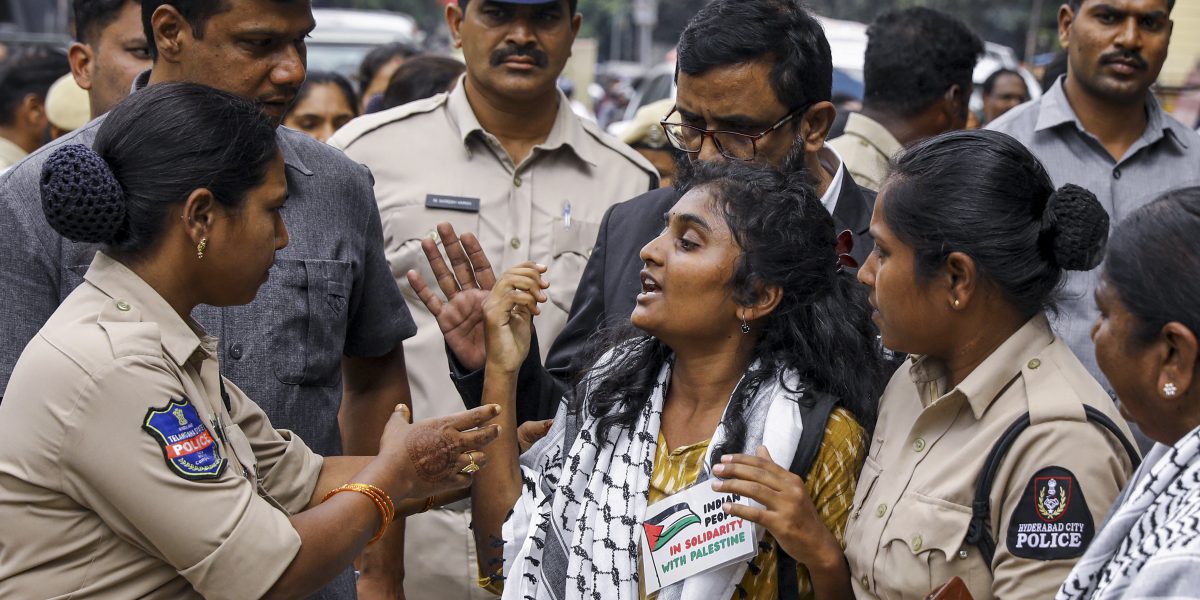India’s current approach stands in sharp contrast to its own history.

Police detain a protester during a demonstration against Israel’s bombing in Gaza and Palestine, at Dharna Chowk, Indira Park, in Hyderabad, Telangana, Tuesday, Oct. 7, 2025. Photo: PTI. (From The Wire)
While the world confronts the horrors unfolding in Gaza, India’s cautious stance on the ongoing genocide is deafening. According to the report by the Centre for Financial Accountability (CFA), Profit & Genocide: Indian Investments in Israel, India’s abstentions at the UN and muted statements betray a foreign policy that shields corporate profit rather than aligning with global responsibility.
The report details how this silence is further reinforced by the extensive involvement of Indian conglomerates in Israel’s military-industrial network. Adani Defence, in partnership with Elbit Systems, produces Hermes 900 drones, the same drones used in Gaza’s skies. Adani’s purchase of Haifa Port links it to Israel’s submarine fleet. Reliance co-produces Spike missiles with Rafael, integral to urban warfare in Gaza. Public sector undertakings such as BEL and HAL supply Barak missiles and refitted tankers for Israel’s arsenal, respectively. Tata Consultancy Services contributes to Project Nimbus, a cloud system enabling surveillance of Palestinians, while Tata Industries invests in Tel Aviv University, a hub for military research. Jain Irrigation and Triveni Engineering supply technologies to illegal settlements. India’s 2023 agreement to send 42,000 workers to Israel, replacing Palestinians stripped of permits, reinforced the machinery of occupation with Indian labour.
This is not neutrality. It is complicity.
Since October 7, 2023, the world has witnessed not just escalating violence in Palestinian territories but a shift in global conscience. Israel’s military campaign in Gaza has left more than 65,000 civilians dead and millions displaced. The UN Independent International Commission of Inquiry concluded that Israel has committed genocide, finding it guilty of four of the five acts defined under the Genocide Convention while citing genocidal intent in Israel’s leadership. This was not legal semantics but a political earthquake. Silence was no longer justifiable.
The International Court of Justice (ICJ) has ordered provisional measures requiring Israel to halt genocidal acts and ensure humanitarian aid reaches civilians, yet Israel has openly defied the court. Governments worldwide are taking steps: Slovenia banned prime minister Benjamin Netanyahu from entry, Italy, Spain and Greece escalated humanitarian support and 28 nations jointly demanded an end to Israel’s genocide. Even within Israel, organisations such as B’Tselem and Physicians for Human Rights have acknowledged the atrocities as genocide.
Businesses are under scrutiny as well. The UN report by Francesca Albaneseemphasised that corporations are not innocent investors but enablers of genocide when their technologies and contracts bolster Israel’s military machine. European legislatures are scrutinising Amazon and Microsoft over cloud services enabling Israeli surveillance. Universities are divesting from arms manufacturers linked to Gaza’s devastation. Shareholders and consumers are revolting against profiteering from war crimes. The world is beginning to reckon with what genocide scholar Robert Melson long argued: that economic structures can reinforce atrocity if left unchecked.
Diplomatic recognition of Palestine has surged in this atmosphere. As of September 2025, 157 of 193 UN member states recognise Palestine, including Britain, Canada, Australia, France, Belgium, and Portugal. In Europe especially, long-standing alignments with Israel are unraveling under public outrage over civilian deaths. This wave of recognition is not just symbolic, it is a rejection of complicity. Arab states and regional allies, initially careful to balance relations for self-interest or US alignment, now confront enormous popular pressure to denounce and reject Israeli policy.
The tide of global conscience is rising. The Global Sumud Flotilla, which was sailing toward Gaza’s besieged shores to deliver food, medicine and dignity to a population starved by blockade and war until Israel intercepted it and abducted its members, embodied the refusal of ordinary people to remain silent. More than a convoy of ships, it was a rebuke to a world order that failed to halt the slaughter. It was also a test of whether nations, including India, continue to avert their gaze or choose to recognise that neutrality in the face of an unprecedented humanitarian crisis is complicity.
Amid this reckoning, India’s current approach stands in sharp contrast to its own history. For decades after independence, India was among the loudest voices defending Palestinian rights at the UN, recognising the PLO in 1974 and Palestine as a state in 1988. That legacy now stands in stark contrast to the government’s silence as Gaza burns. The tragedy of this policy lies in its hypocrisy. Indian foreign policy has historically been against neo-colonialism, presenting itself as a defender of sovereignty and an advocate of the oppressed. Yet in the case of Palestine, visibly the most oppressive case of settler-colonialism, the government retreats into silence. This inconsistency is counterproductive, exposing selective morality while weakening India’s credibility. It is untenable to lecture the world on resisting domination while enabling a military-industrial partnership that sustains one of the most visible colonialisms of our age. By insulating corporations and clinging to profit, India has transformed from an ally of the oppressed to an enabler of their oppression.
Defenders of the current approach argue that Israel is inevitable for India’s defence, agriculture and technological developments. But inevitability is a false narrative. Nations such as Spain, Norway and Ireland, with significant security needs of their own, have spoken out against Israeli atrocities while diversifying their partnerships elsewhere. India’s embrace of Israel is not a necessity but a political choice shaped by corporate interests. As the CFA report shows, the calculus has shifted from solidarity to conglomerate gain.
India must reclaim its legacy of solidarity and recognise that corporate complicity stains the nation’s moral standing. The genocide in Gaza is not just a regional tragedy, it is the defining test of our generation. The world is picking sides, businesses are being held accountable and silence is no longer an option. Whether India upholds justice or persists in complicity will determine not only its role in the plight of Palestinians but also its ethical legacy in the 21st century.
Hajira Puthige is an intern with Centre for Financial Accountability and author of the report ‘Profit & Genocide: Indian Investments in Israel.’
This article was originally published in The Wire, and you can read here.
Centre for Financial Accountability is now on Telegram and WhatsApp. Click here to join our Telegram channel and click here to join our WhatsApp channel, and stay tuned to the latest updates and insights on the economy and finance.

